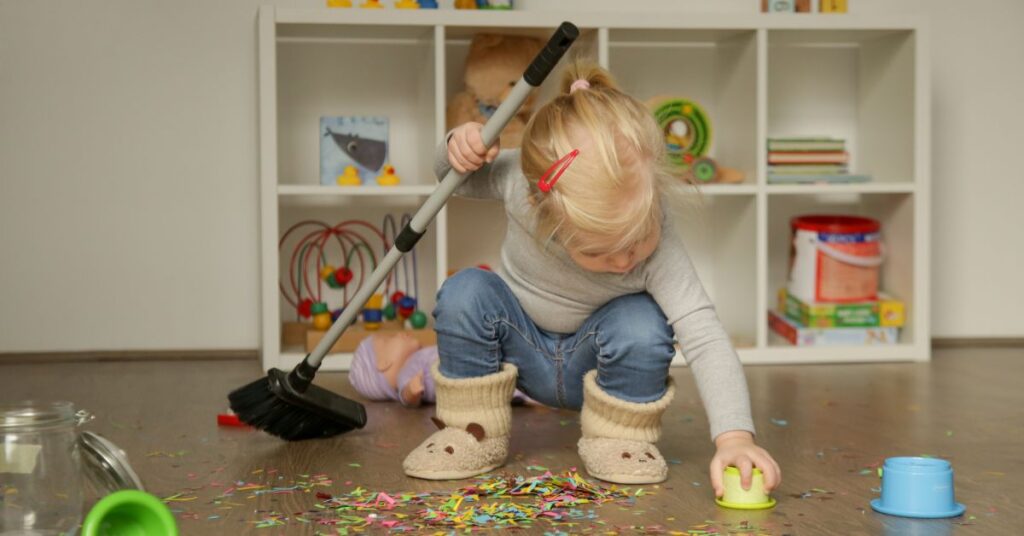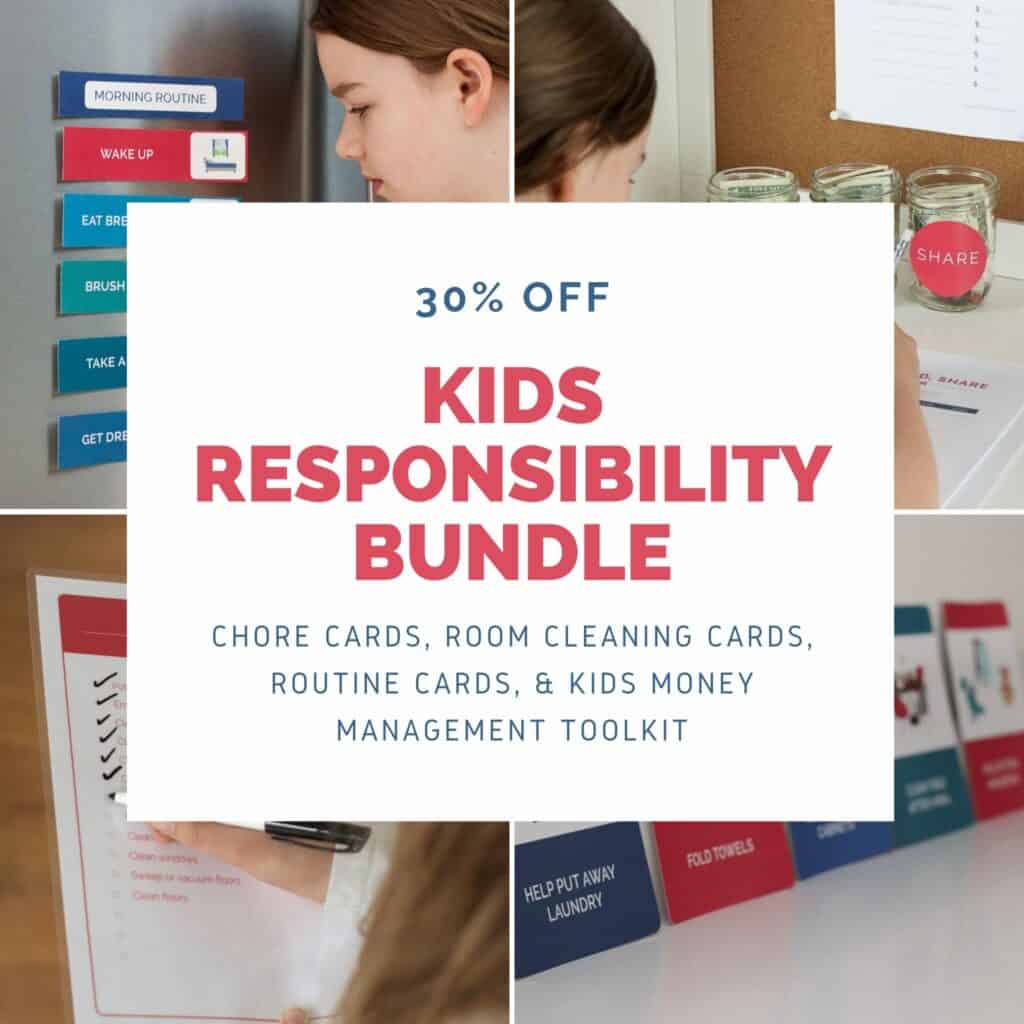10 Executive Functioning Skills – and How You Can Support Your Child’s Growth in These Important Skills
This executive functioning skills list outlines the ten skills kids need for academic and social success followed by tips for how parents can support kids’ growth.
** As an Amazon Associate I earn from qualifying purchases. **
Executive functioning skills are a group of complex mental processes that are needed to accomplish tasks and achieve goals.
These skills develop over time in children. And while we can’t expect a child to demonstrate an executive functioning skill beyond their developmental ability, we can, as parents, support our children’s growth in these skills.
Parents often don’t realize their child’s lack of impulse control, time management, or disorganization is linked to skill development and not necessarily the result of laziness or defiance.
With a better understanding of executive functioning skills and the best way to support kids’ development of them, parents can support their child’s growth.
See related: What is Executive Functioning in Children and Why Is it Important for Parents to Understand?
Executive functioning skills list – how you can support your child’s development of these 10 skills
The following is a list of the ten executive functioning skills your child needs to develop over their childhood and young adulthood to be successful academically and in life.
Each of these listed skills is followed by tips and advice on how you can support and help your child’s develop these skills.
Metacognition
Metacognition is the ability to be aware of one’s own thinking processes, including strengths and weaknesses. When we’re aware of what we don’t know or what our weaknesses are, we can work to improve them.
How parents can help:
- Avoid rewards for good grades or successful completion of a task.
- Instead, make failure normal and not something to be ashamed of.
- Model self-awareness by being forthright with your weaknesses and emphasizing how you intend to improve.
Self-control
Self-control is the ability to stop a behavior or thought that’s no longer useful or appropriate. The ability to stop and think about choices or actions before executing them.
How parents can help:
- Recognize that children cannot be expected to demonstrate the same level of self-control as adults or even older children.
- Show calm and empathy when your child is unable to demonstrate self-control and avoid punishment.
- Teach coping strategies and emotional awareness to cope with stress.
- Once your child is calm or removed from the situation, brain-storm together more appropriate ways to respond or handle a situation.
- Play games that help kids practice self-control such as Jenga, Don’t Break the Ice, or Red Light Green Light.
See related: 10 Games That Teach Self-Control
Working memory
Working memory is the ability to hold information in your mind for short periods of time, remember instructions, and use those instructions to complete a task. Having a strong working memory allows us to accomplish tasks faster and have more accuracy.
How parents can help:
- Recognize that working memory is a skill that continues to improve as kids mature so try not to condemn forgetfulness.
- Be clear and concise when giving directions and ask kids to repeat directions back to you, if necessary.
- Teach older kids how to use mnemonics to remember information.
- Use visual aids, lists, and charts to help kids remember what they need to do to get ready in the morning, complete their chores or homework, etc.
- Play games to help kids improve their working memory such as Memory, Rat a Tat Cat, or Simon
See related: 16 Working Memory Games (That Are Fun for Kids!)
Help your child get started with chores, follow a routine and learn about money with the Kids Responsibility Bundle. The bundle includes 101+ Chore Cards for Kids, Room Cleaning Cards for Kids, 70+ Routine Cards for Kids, and the Kids Money Management and Allowance Toolkit. Click here or the image below to learn more.
Emotional control
Emotional control involves the ability to self-regulate and manage emotions, particularly in stressful situations. Young children have very little emotional control. This is a skill that’s continuously developing in children as they mature.
How parents can help:
- Approach strong emotions (including anger) with calmness and empathy.
- Calmly sit beside your child, hug or hold them while they’re wrestling with emotions. This comfort will aid their understanding of emotion regulation.
- Model emotional control to your child in the way you interact with them (as much as possible).
- Recognize that when a child’s emotions are out of control they cannot be reasoned with or disciplined.
- Read children’s books to your child about strong emotions and how to handle them (See a list here).
Task initiation
Task initiation is the ability to start a task on one’s own even when it’s not something we want to do. This skill requires self-regulation.
How parents can help:
- Follow routines as much as possible to provide kids with cues about what comes next in the day.
- Ask your child when they plan to do a task and then set an alarm to remind them. Letting them have control will make them less resistant to doing the task.
- Make it a family rule that certain tasks like chores or homework need to be prioritized over other (typically more fun) activities.
- Avoid getting angry with a child who has forgotten to initiate a task and instead, brainstorm ideas with them about how they can do better next time.
Planning and goal setting
Planning and goal setting is the ability to break down a task into smaller steps, create a plan, and follow through on that plan.
How parents can help:
- Have your child create their own routines to get them thinking about what needs to be accomplished and when.
- Use visual aids, lists, and charts to help kids remember which steps come next.
- Discuss with your child what needs to be accomplished first before more enjoyable activities can occur.
Organization
Organization is the ability to create and maintain a process of arranging and structuring resources, information, or activities for efficient and effective use.
How parents can help:
- Encourage kids to clean up messes and put away previously used items.
- Pick certain times in the day when cleaning occurs – such as before dinner or just before getting ready for bed.
- Clean up alongside your child to model organization skills.
- Create spaces where everything has a specific place.
- Purge and remove items no longer being used whenever possible. The fewer items in a space, the less work it is to make it tidy.
- Coach older children on how to stay organized with homework and school supplies.
Time management
Time management is the ability to estimate how much time is needed for a task and how to use that time effectively.
How parents can help:
- Make use of timers and alarms whenever possible.
- Ask kids when they will complete a task and compromise on a time that makes sense.
- Use routines whenever possible so kids begin to learn what comes next.
- Use visual aids, lists, and charts to help kids remember what they need to do at certain times during the day.
Cognitive flexibility
Cognitive flexibility is the ability to switch between different tasks or mental sets. It’s also the ability to “go with the flow” when something doesn’t go according to plan.
How parents can help:
- Show patience and empathy when kids have difficulty making a transition or are disappointed because something didn’t work out.
- Model flexibility for kids and try to express an “oh well!” attitude when something doesn’t go according to plan.
- Recognize that this is a skill that improves with maturity.
- Teach coping strategies and emotional awareness to cope with stress.
Attention and focus
Having attention and focus means being able to pay attention, think about, work on, and complete tasks without distraction.
How parents can help:
- Work with your child to limit the use of electronics and screens which can decrease attentiveness.
- Make sure your child gets adequate exercise during the day.
- Recognize that kids’ attention spans are limited (the general rule of thumb is 2-3 minutes per year of child’s age) so don’t demand more than they’re capable of.
- Try to find your child’s current passion – Legos, painting, playing with blocks, for example – and give them ample time to focus on that activity.
See related: What’s the Average Attention Span by Age for Children?
Support, don’t push
The most important thing parents can do to help their child’s development of executive functioning skills is to gently support them in their growth.
Pushing kids to achieve certain executive functioning milestones before they’re ready won’t make these skills develop faster and will likely hurt your child’s self-esteem.
Being realistic about the skills your child can demonstrate at a certain age, coaching them on how to better demonstrate skills as well as expressing ample patience, will go far in supporting your child’s natural development of essential executive functioning skills.
See related:
5 Tips to Get Your Kids to Clean Their Messy Rooms
The Best Bedtime Routine to Get Your Kids to Fall Asleep – and Stay Asleep
How to Establish a Calm Morning Routine for Kids That Actually Works
The Trick to Teaching Kids How to Manage Their Own Time and Get Things Done (Without Nagging)
What to do next…
1. Subscribe to Self-Sufficient Kids’ email list.
Like what you read here and want to learn more? Every Thursday I’ll send you one parenting tip about raising self-sufficient kids and creating the peaceful relationship you yearn to have with your child. Click here to sign up.
2. Take one of my quizzes!
Find out if you’re raising a self-sufficient kid (click here) or if you’re doing too much for your kids (click here). At the end of each quiz, you’ll be asked to provide your email address to see the results.
3. Get your kids started on chores.
Learn how to get your child started on chores (& keep them motivated + avoid power struggles) by enrolling in my Get Your Kids Successfully Started on Chores course. Click here to learn more and sign up.

About Kerry Flatley
Hi! I’m Kerry, the mother of two girls and a certified parent educator. I believe it is possible for parents to have a supportive, loving, and warm relationship with their kids while raising them to be independent and ultimately self-sufficient. Over the years, I’ve read numerous books and articles that support this belief and I’ve put these ideas into practice with my own kids. Read more about me and Self-Sufficient Kids here.



